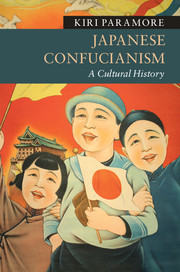Book contents
- Frontmatter
- Epigraph
- Contents
- List of figures
- List of maps
- Acknowledgments
- Notes on the text
- Timeline
- Maps
- Introduction
- 1 Confucianism as cultural capital (mid-first millennium CE–late sixteenth century CE)
- 2 Confucianism as religion (1580s–1720s)
- 3 Confucianism as public sphere (1720s–1868)
- 4 Confucianism as knowledge (1400s–1800s)
- 5 Confucianism as liberalism (1850s–1890s)
- 6 Confucianism as fascism (1868–1945)
- 7 Confucianism as taboo (1945–2015)
- Epilogue: China and Japan: East Asian modernities and Confucian revivals compared
- Notes
- Works Cited
- Index
2 - Confucianism as religion (1580s–1720s)
Published online by Cambridge University Press: 05 April 2016
- Frontmatter
- Epigraph
- Contents
- List of figures
- List of maps
- Acknowledgments
- Notes on the text
- Timeline
- Maps
- Introduction
- 1 Confucianism as cultural capital (mid-first millennium CE–late sixteenth century CE)
- 2 Confucianism as religion (1580s–1720s)
- 3 Confucianism as public sphere (1720s–1868)
- 4 Confucianism as knowledge (1400s–1800s)
- 5 Confucianism as liberalism (1850s–1890s)
- 6 Confucianism as fascism (1868–1945)
- 7 Confucianism as taboo (1945–2015)
- Epilogue: China and Japan: East Asian modernities and Confucian revivals compared
- Notes
- Works Cited
- Index
Summary
The Way of the Sages, what is recorded in the Six Classics, there is none of it which does not return to reverence for Heaven.
Ogyū Sorai, Benmei, 1717 (NST 36: 120)This is the first of three chapters which deal with Confucianism in early modern Japan, in the period of the Tokugawa shogunate (1603–1868). Confucianism in early modern Japan was vernacularized and popularized and emerged as a powerful independent tradition of ideas, practice, and politics. Eventually, it came to exercise an omnipresent influence over nearly every field of Japanese cultural production, and to provide the intellectual and linguistic frameworks through which even the sociologies and technologies of Western modernity would be recreated in Japan. The next three chapters seek to reshape the contours through which we understand Confucianism's role in early modern Japan by considering a Confucianism not only of ideas, but of religious, political, cultural, and scientific practice.
This chapter, Chapter 2, will concentrate on how Confucianism became grounded in Japanese society during the early modern period, particularly in the seventeenth century. It will argue that it was the religious aspects of Neo-Confucianism, notably its forms of practice, and perceptions of the meanings of those practices, which crucially facilitated Confucianism's social popularization and impact during this period. Chapter 3 will examine the role of this newly socially embedded Confucianism in the early modern Japanese public sphere, considering how Confucian ideas and practices influenced general culture and politics. Chapter 4 will concentrate on Confucianism's role in the knowledge order of early modern Japan, including in fields of Western learning.
Confucianism as independent tradition
Through the first half of the seventeenth century, Neo-Confucianism emerged and was popularized in Japan as a separate religious tradition led by teachers who identified themselves primarily as Confucians. Although Confucian ideas were present in Japan pre-1600, people interested in these ideas remained primarily attached to other traditions like Buddhism. But by the early 1600s, there were a significant number of Confucian specialists in Japan identifying themselves primarily as Confucians, and usually also as Neo-Confucians. Below I consider how Confucianism emerged as an active independent tradition, firstly by charting the emergence of The Way of Heaven, a syncretist tradition, the popularization of which can be seen as marking the transition of Confucianism into an independent popular religious tradition in Japan at the turn of the sixteenth into the seventeenth century.
- Type
- Chapter
- Information
- Japanese ConfucianismA Cultural History, pp. 41 - 65Publisher: Cambridge University PressPrint publication year: 2016

